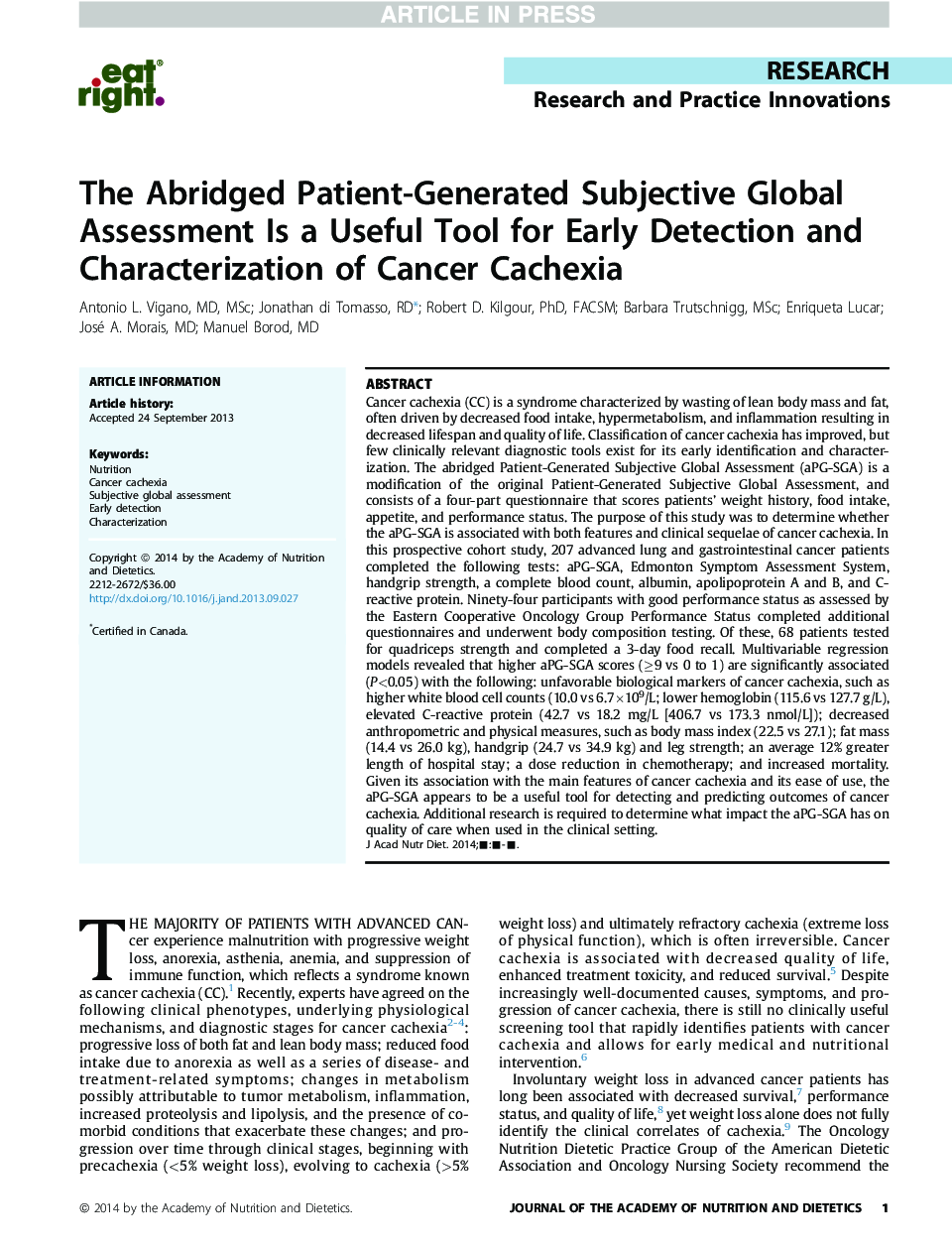| کد مقاله | کد نشریه | سال انتشار | مقاله انگلیسی | نسخه تمام متن |
|---|---|---|---|---|
| 5869598 | 1564063 | 2014 | 11 صفحه PDF | دانلود رایگان |
عنوان انگلیسی مقاله ISI
The Abridged Patient-Generated Subjective Global Assessment Is a Useful Tool for Early Detection and Characterization of Cancer Cachexia
ترجمه فارسی عنوان
ارزیابی جهانی ذهنی تهیه شده توسط بیمار، یک ابزار مفید برای تشخیص زودرس و تشخیص سرطان سینه است
دانلود مقاله + سفارش ترجمه
دانلود مقاله ISI انگلیسی
رایگان برای ایرانیان
کلمات کلیدی
موضوعات مرتبط
علوم زیستی و بیوفناوری
علوم کشاورزی و بیولوژیک
دانش تغذیه
چکیده انگلیسی
Cancer cachexia (CC) is a syndrome characterized by wasting of lean body mass and fat, often driven by decreased food intake, hypermetabolism, and inflammation resulting in decreased lifespan and quality of life. Classification of cancer cachexia has improved, but few clinically relevant diagnostic tools exist for its early identification and characterization. The abridged Patient-Generated Subjective Global Assessment (aPG-SGA) is a modification of the original Patient-Generated Subjective Global Assessment, and consists of a four-part questionnaire that scores patients' weight history, food intake, appetite, and performance status. The purpose of this study was to determine whether the aPG-SGA is associated with both features and clinical sequelae of cancer cachexia. In this prospective cohort study, 207 advanced lung and gastrointestinal cancer patients completed the following tests: aPG-SGA, Edmonton Symptom Assessment System, handgrip strength, a complete blood count, albumin, apolipoprotein A and B, and C-reactive protein. Ninety-four participants with good performance status as assessed by the Eastern Cooperative Oncology Group Performance Status completed additional questionnaires and underwent body composition testing. Of these, 68 patients tested for quadriceps strength and completed a 3-day food recall. Multivariable regression models revealed that higher aPG-SGA scores (â¥9 vs 0 to 1) are significantly associated (P<0.05) with the following: unfavorable biological markers of cancer cachexia, such as higher white blood cell counts (10.0 vs 6.7Ã109/L; lower hemoglobin (115.6 vs 127.7 g/L), elevated C-reactive protein (42.7 vs 18.2 mg/L [406.7 vs 173.3 nmol/L]); decreased anthropometric and physical measures, such as body mass index (22.5 vs 27.1); fat mass (14.4 vs 26.0 kg), handgrip (24.7 vs 34.9 kg) and leg strength; an average 12% greater length of hospital stay; a dose reduction in chemotherapy; and increased mortality. Given its association with the main features of cancer cachexia and its ease of use, the aPG-SGA appears to be a useful tool for detecting and predicting outcomes of cancer cachexia. Additional research is required to determine what impact the aPG-SGA has on quality of care when used in the clinical setting.
ناشر
Database: Elsevier - ScienceDirect (ساینس دایرکت)
Journal: Journal of the Academy of Nutrition and Dietetics - Volume 114, Issue 7, July 2014, Pages 1088-1098
Journal: Journal of the Academy of Nutrition and Dietetics - Volume 114, Issue 7, July 2014, Pages 1088-1098
نویسندگان
Antonio L. MD, MSc, Jonathan RD, Robert D. PhD, FACSM, Barbara MSc, Enriqueta Lucar, José A. MD, Manuel MD,
